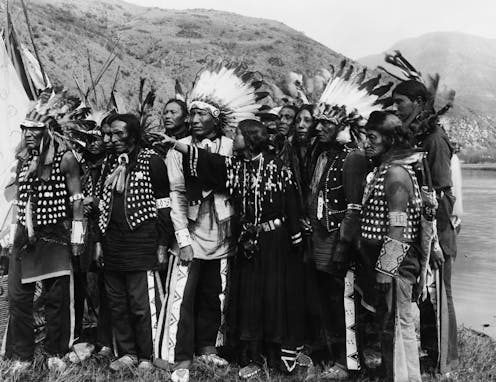Indigenous voices can be heard without being constitutionally enshrined, just look at the US
- Written by Yancey Orr, Associate Professor of Environmental Science and Policy, Smith College

It was always going to be a big ask for Australians to vote in favour of an Indigenous Voice to Parliament.
There’s been much said about the challenges posed by the double majority requirement.
In the wash-up, many are asking what the path to reconciliation is now.
Some answers may lay in other settler societies.
North American Indians provide an example of how representation can occur, without having to amend the constitution.
Change in the face of harsh laws
After 350 years of losing wars, land, and sovereignty, American Indians altered their approach to engaging with the federal government in the mid-20th century.
The National Congress of the American Indians (NCAI), a consulting organisation to the government, was central to this change.
Although American Indians could not alter their history, they did reverse its trajectory.
By the 1940s, they were about to face an era of government policies so harsh it is referred to as the Termination Period.
Federal laws took away tribal rights once promised by treaties. Government programs tried to end American Indian communities through assimilation.
In 1944, American Indians created the National Congress of the American Indians. Many of those involved had worked as government officials and had a good understanding of the system.
Despite its name, it can’t make laws, like the US Congress.
Rather, it is an organisation that lobbies and educates the government, like other industry and special interest groups.
Changing the trajectory
Remarkably, by the late 1960s, through the National Congress of American Indians’ efforts, American Indians had not only survived, but the Termination Period had given way to tribal self-determination.
The National Congress of American Indians advocated for legislation such as:
School enrolments expanded, services increased, and education and health programs brought the highest quality of life many communities had known.
In improved tribal schools, children can now learn both English and their Indigenous language.
Read more: If there is to be any healing after the Voice referendum, it will be a long journey
Healthy foods, grown by tribes, are making a comeback on reservations that were once rural food deserts.
Of course, there’s a lot more progress still to be made. American Indian men have the lowest average life expectancy of any ethnic group in the US. Issues with addiction, unemployment and trauma still loom large.
And American Indians remain displaced, having lost 99% of their ancestral lands over time.
But compared to the situation 80 years ago, we’ve come a long way.
Progress in real time
My tribe describes the transformation of this period in a short story.
In the 1970s, our tribe had the following items in our posession: a trailer, a desk, and the phonebook sitting on top of it.
Our numerous ventures now contribute one billion Australian dollars to the regional economy.
We run clinics, house elders, provide daycare, and our youth thrive in schools and careers.
We were able to build on the momentum created by the National Congress of American Indians and take control of our future.
The Congress focuses on policy. It mainly employs experts who research proposals, suggest changes to legislation, meet with government representatives, and provide reports to the public.
Because of their work, American Indians are served better by hundreds of programs and millions of dollars in funding.
The National Congress of American Indians does this without being enshrined in the constitution.
In their nearly 80 years, the organisation has built social capital and credibility.
Because it’s so trusted, it secures funding from tribes, corporations, and government agencies. With yearly financial surpluses, it has set aside millions of dollars in assets to safeguard its future.
A voice in a different form
There has been a long history of trying to establish Indigenous representation at the federal level in Australia.
Most recently in 2009, Aboriginal communities established the National Congress of Australia’s First Peoples.
It was disbanded in 2019 after years of under-funding.
It’s hardly surprising a key lesson its leaders learnt was the need for stable funding. Being written into the constitution was seen as the way to get this.
The rationale is understandable, but amending a country’s constitution is a strong measure.
Read more: 'Lies fuel racism': how the global media covered Australia's Voice to Parliament referendum
Perhaps constitutional change was too big a logistical and psychological issue for the public to accept. A body like the National Congress of American Indians could be the alternative.
It would require long-term, bipartisan funding. The political appetite for such a plan is unclear.
But financial certainty could enable Aboriginal people to provide essential consultation and help train future leaders.
It may also prove more palatable for voters across the political spectrum.
In North America, such a lobbying and policy organisation has helped ensure much better outcomes for its Indigenous people.
With the right support, the same could be achieved in Australia.
Authors: Yancey Orr, Associate Professor of Environmental Science and Policy, Smith College




